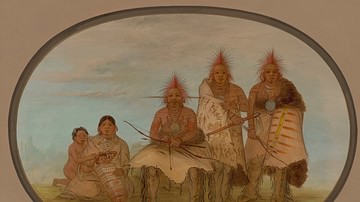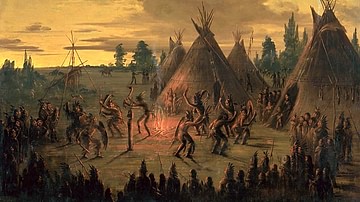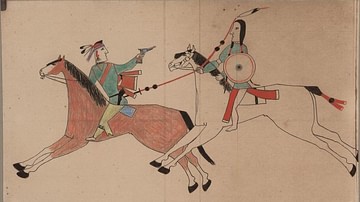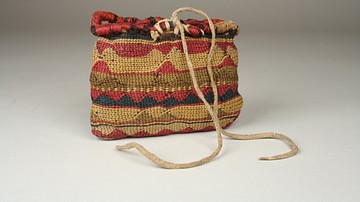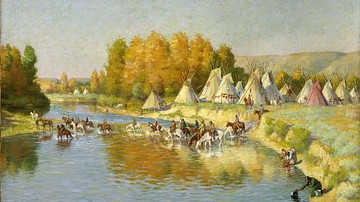The Snake Brother is a legend of the Pawnee nation, which corresponds to the "King of the Waters" – or Snake Man – myth told by many other Native peoples of North America. Although many different indigenous nations tell similar stories, with cultural variations, the Snake Man is almost always told the same way except for this version.
The Snake Man myth always involves two men (sometimes brothers), a warning about eating taboo food, one man (or brother) eating the food and transforming into a water snake (or horned serpent), a tree of some kind (usually large), and a great flood. The Snake Man, after his transformation, usually summons his family to the shore of a lake where he drowns them (or drowns the whole community) and then takes up residence there as "King of the Waters" who, from then on, will drown other unsuspecting visitors.
The Snake Brother departs from these usual details by, first, moving the action of the piece inland away from any water source, removing the Great Flood motif, changing the type of serpent to a rattlesnake, and having the Snake Man then serve as a source of good luck for his people.
As with all Native American tales, the story is open to various interpretations, but, at its simplest, it emphasizes the importance of observing tradition. The older brother ignores the younger brother's warning not to mix the squirrel – regarded as "not real meat" – with the marrow of the buffalo – the traditional and highly respected food source of the Plains Indians. After the older brother mixes the two anyway, he is transformed. At this point, in the usual telling of the tale, the Snake Man becomes a malevolent force, but, here, owing to the younger brother's loyalty in fulfilling his vows to the snake and following his instructions, the Snake Man benefits not only his family but his entire community.
Text
The following version of the tale comes from Pawnee Hero Stories and Folk-Tales (1889) by George Bird Grinnell.
One time, long ago, a big party of Pawnees went on the warpath down to the south. They could find no enemies anywhere, and they went a long way south. In this party were two brothers, poor boys, and one day as they were traveling along, apart from the others, in a piece of woods where it was very thick, they got lost. When they found that they were lost, they tried to go back to the camp, but they could not find the others, and at last gave up looking for them and started to go back north to their home. They had no food with them, and were looking about for something to kill, so that they might eat. As they were going along, they came upon a dead buffalo that had been killed some time, and there was nothing of it left but the bones, so they took some of the marrow bones, and carried them along with them, until they made a camp.
Not far beyond here they stopped to rest. There was a tree growing near where they stopped, and as they looked up into it, they saw a squirrel run up the tree. One of the brothers caught up his bow and arrows, and the other said, "Oh, kill him, kill him, quick." The boy shot and killed it, and they skinned it, and roasted it over the fire. While they were cooking it the elder brother said, "I wonder if it is good to eat the marrow and the squirrel together." The younger said, "No, it is not good to do so. This is not real meat." The elder thought the two kinds of food would be good together, and they disputed about this for some time.
The elder brother kept coaxing the younger to eat the squirrel and the marrow together, but the younger said, "Oh, brother, I do not like to do this. To me it does not seem good. But if you wish to do it, why don't you?" The elder said, "I think I will do so;" and he did so, taking a bite of squirrel, and then a bite of marrow. He said, "It is nice, you had better take some." But the younger brother would not. He ate only the marrow. After they had eaten, they did not go on further, but slept there.
About the middle of the night, the elder brother felt a noise in his feet, and he sat up and felt of his legs and feet, and he found that his feet were stuck together, and were beginning to get round, like a snake, and had a rattle on the end of them, and that his legs were round and like the tail of a great big rattlesnake. He reached over, and put his hands on his brother, and shook him, and said to him, "Get up. There is something the matter with me." The younger brother woke up, and felt of his brother, and found how it was; as if he was changing into a snake, beginning at his feet. When he saw this he felt very badly. Then the older brother began to talk to the younger, and to give him good advice, for he felt very sad.
He said, "Now I am going to die, and leave my young brother here alone on this prairie. He is so young, he will not be able to find his way home, and he must die, too. Surely this has happened because I ate the marrow and the squirrel together." While he was talking, the change had moved up to his waist.
After a little while he got more hopeful, and he said, "Now, brother, I know that you will get home safely. I will protect you. I know that I am going to be a snake, and I shall stay right here. You see that hole," and he pointed to a hole in the bank. "When I have changed into a snake, take me in your arms, and carry me over to that hole. I am going to stay there forever. That will be my home, for that is the house of the snakes. When you go back home, you must tell our father and mother how it was, and whenever you want to go on the warpath, take a big party and come down this way, and come right here, to this very place, and you will see me, for I shall be here. Now, brother, when you go back home, sometime after you have reached home, I want you to come back all alone; come right here. You know what I told you; do not be afraid of me. I believe this was to happen to me, and I could not help it. After you have once come all alone, then the second time you may bring some others with you, but the first time come alone."
So, he talked to his brother, and as he spoke the change kept going on. While it was moving up his body, until it got to his head, he was still like a man in his mind, but all his body was like a great big snake. Then he spoke to his brother, and said, "Now, brother, cover up my head with the robe, and after a little while take it off again." The younger brother did as he was told, and when, after a while, he took the robe off, there he saw an immense snake's head as broad as his two hands. The elder brother had completely changed into a snake.
The young man took the snake in his arms, and carried him over to the hole, and put him on the ground by it. He felt very sad to go away and leave his brother here. Before he started, he spoke good words to the snake, and said, "Now, brother, I am going home, and I ask you to take pity on me, and to protect me. I do not know the country I am going through, and you must take care of me. Do not forget the promises you have made me." After he had spoken, he did not wait to see the snake go into the hole, but started on his journey, and went off toward his home.
When he reached the village, he told all these things to his father and his mother. He said to all his relations, "Do not mourn for him. He is alive and he is well. The only trouble is, that he is in the shape of a snake." After he had been home ten days, he told his mother to make for him five pairs of moccasins, that he was going on the warpath for himself. His mother did so, and he stuffed them full of parched corn, and took a little sack of pounded buffalo meat on his back and started back to see his brother.
It took him seven days fast traveling to get to where he left the snake. When he had come near the place, he saw there the hole where he had left his brother. He went up close to the hole and began to speak. He said, "Brother, I am here. I have come on the warpath, and I am here to see you. You told me to come, and to come alone. I have done what you bade me and am here. Now, brother, remember to keep your promises. I want to see you this afternoon."
He stood there a little while, and then there began in the hole a rattling and a rustling and scraping noise, and presently dust began to roll out, and then out of the hole came this great big snake, which was his brother. First came out this great snake, and after him many other large ones came out, and crept all about, but the great snake, his brother, lay just outside the hole. The boy went up to the big snake and took it in his arms, and hugged it, and spoke to it, and the snake put out its tongue, as if it were kissing him. Then the boy put it down on the ground, and all the other snakes came back, and went in the hole, and after them all, last, the big snake went in the hole.
Then the boy left this place, and went on a little further, and about sunset he came to a little creek, and here he lay down and slept. In the night he dreamed of his brother, who spoke to him and said, "Now, brother, I am glad that you have come down to see me, as I told you to. And now I say to you, be brave. Have courage. To-morrow morning when you awake, dress yourself up as if you were going to fight. Paint your face, put feathers in your head, make yourself ready to fight."
The next morning the boy woke up, and as the snake had told him in the dream, so he did. He painted his face and tied feathers in his head and dressed himself up for the fight. Then he started on. Pretty soon he came to a little hill, and as he looked over it, he saw people coming toward him, people, and many horses. He thought they were Sioux, and when he saw them, he went back a little, to find a place where he could hide. He went back to the little creek where he had slept, and there he sat down in the brush. When he had hidden himself in the brush, he waited; and the people came straight toward where he had hidden himself and camped just below where he was. After a little while he raised himself up and looked at them, and saw only two persons, and presently he saw that one of them was a woman. He watched for a long time, looking about to see if there were any more, but he could see only these two. Then he considered what he should do. While he was thinking, it came to him what the snake brother had said to him in the night, and then he knew what to do.
He crept slowly along through the brush toward their camp, and when he got close to them, about twenty yards distant, he raised up his head and looked. He saw the woman cooking, and there were hanging on a little tree the man's bow and arrows and shield and spear, but the man he could not see. He was lying down asleep somewhere nearby. The boy waited and watched. He was excited, and his heart was pounding against his ribs. After a little while, the woman left the fire and walked away toward the horses. Perhaps her husband had said to her, "The horses are going off, you had better go and turn them back." When she went toward the horses, the boy was going to run up to the man and kill him, but before doing so he changed his mind; for he thought, "If I kill him, perhaps the woman will get on a horse, and ride away, driving the other horses with her." So, he waited until the woman had come back. When she had returned to the fire, he ran up toward her, and she heard him coming, and ran to wake her husband; but just as she got to him, the boy was by her side. He shot two arrows into the man and killed him and counted coup on him and captured the woman. He took the whole scalp of his enemy's head.
Then he took the woman and went down to where the horses were, and they got on two of them, and rode back to where his brother, the snake, lived, driving the horses before them. Just before they got to the hole, the boy took his lariat and caught a nice spotted horse and a mule, and tied them up to the tree, and called up the woman, and tied her up against the tree as tight as he could tie her. When he had done this, he went up to the hole and began to talk.
He said, "Oh, my brother, I see now that what you have promised me comes true. I did what you told me. Now here are these two animals and the woman; I give them to you for being good to me. They are yours. I am glad for what you have done for me this day." When he had finished saying this he spoke again, saying, "Now, brother, I want to see you once more. I am going off, and I want to see you before I go." After a little while he heard again the rattling sound in the hole, and saw the dust coming out of it, and then his brother came out of the hole, and then afterward the smaller snakes; and these all went down to the tree and climbed up into it. The tree was thick with them.
Then the boy did as he had done before. He went close to the hole and took his brother up in his arms and hugged him, and the great snake thrust out his tongue, as if kissing him. Then the boy spoke again and said, "Now, brother, I am going away, and I give you these two animals and this woman to keep. They are yours." Then he started for his home, and after a long time he arrived at the village.
After a time, he determined to start off again on the warpath, and this time he took a party with him. He had told the whole tribe what had happened, and how his brother had protected and helped him; and he said to those warriors who were going with him, "Let each one of you take a present with you for my brother; some beads or eagle feathers or some tobacco as an offering, so that he may help you." They started south to go to the place where his brother lived. When they got there, the young man said to the others, "Now you must, each one of you, give something to my brother. Call him by his kin name, and ask him to help you, and to make you successful; and leave the things before the hole." They did as he said, and when they had made their presents, they went by. They saw nothing, for the brother did not call out the great snake.
Two or three days after they had passed the place, they found a camp of Sioux, and took a lot of horses and killed some of the enemy. Then they went back, and when they came to the snake's home, they took a horse and led it up near the hole and killed it, and gave it to him, and left the scalps at the mouth of the hole as presents to him. When they reached the village, there was great joy and a good time. They had all kinds of dances, for they were glad that the war party had killed some Sioux.
After that another war party started out, and the brother said to them, "Go straight to my brother, and make him a present, and ask him to give you good luck, and you will be successful." And it happened as he had said.
The brother was always fortunate in war. He became a chief and was very rich, having many horses. Ever after that time, when he took the lead of a war party, all the poor men would come and say, "I want to go with you." They knew that his brother was a snake and would give him good luck.

